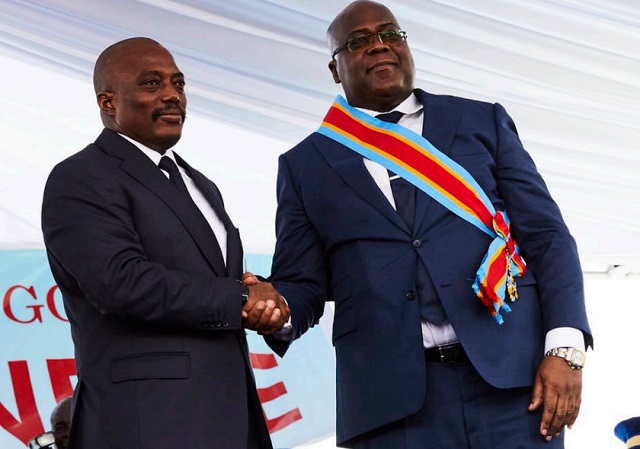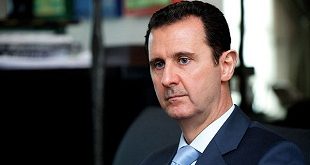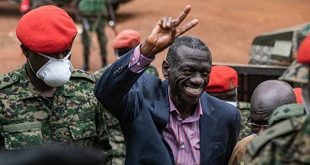
Following endless, futile negotiations with the Kabila camp, President Tshisekedi appears to have finally recognised the limits of the coalition government
| ALBERT KASANDA | The rickety coalition that has governed the Democratic Republic of Congo (DRC) for 20 months, forged by President Félix Tshisekedi and his predecessor Joseph Kabila, appears to be falling apart.
In 2019, for lack of a parliamentary majority, Tshisekedi chose to share power with his former rival, Kabila, in a coalition of their respective political platforms – the Cape for Change and the Common Front for the Congo. The Cape for Change is led by Tshisekedi and opposition figure Vital Kamerhe.
Rather than put the country on the path of economic and social recovery as intended, this alliance turned out to be a centre of conflict from early on. The alliance partners have fought over the sharing of ministerial posts. They have also clashed over the control of other state agencies, including the judiciary and the national electoral commission.
The tensions have become more pronounced in the last six months, as shown by, for example, the ousting of Jean-Marc Kabund a Kabund, the interim president of Tshisekedi’s party, Union for Democracy and Social Progress, from his post as vice president of the National Assembly. This was at the instigation of Kabila’s platform. The members of the platform in the government have also been refusing to execute orders from Tshisekedi.
In addition, the parliament, which is dominated by Kabila’s platform, has accused Tshisekedi of violating the constitution. He appointed three new judges to the constitutional court in July and the Kabila camp considers the appointment to be flawed. They also accuse the president of wanting to control the country’s judicial institutions.
Members of parliament aligned to Kabila have been boycotting initiatives by Tshisekedi, in both the government and parliament. They refused to take part in the swearing-in of the three recently appointed judges.
Unworkable marriage
Tshisekedi became president 20 months ago. Before then, his political party had been the main opposition party for more than 35 years, to the successive regimes of Mobutu Sese Seko, Laurent Désiré Kabila and his son Joseph Kabila.
As his party didn’t get enough MPs to form a government, he got into a coalition with Kabila’s Common Front for Congo, which had more than the required number of MPs. This enabled him to lead the war-weary, unstable country, promising to rebuild it.
But being a president without a loyal parliament made his position precarious. From early on, the governance of the country was like a vehicle driven by two people at the same time, without any prospect of positive economic outlook.
It didn’t take long for a breakdown to happen.
Major disagreements arose between the coalition partners. They differed over how to share ministerial posts, management of the state-owned companies, diplomacy, the electoral process, appointments of the head of the electoral commission as well as judges of the constitutional court, to mention but a few.
From the onset, many observers dismissed the coalition between Tshisekedi and Kabila as an unholy alliance doomed to fail. The experience of the last 20 months supports the sceptics’ view that the coalition was never sincere about working together for the benefit of the Congolese people.
For Kabila, the motivation seems to be the desire to retain power behind the scenes. His platform used its parliamentary majority to get cabinet positions and other positions in stated-owned companies (such as the national railway of the Democratic Republic of Congo and Gécamines, the Congolese commodity trading and mining company).
For Tshisekedi, the main goal appears to have been to take advantage of the opportunity offered by the coalition to destroy the system of cronyism and corruption that had become entrenched under Kabila. He relied on popular support and political gamesmanship to tighten his grip on power.
Looming divorce
After endless, futile negotiations with the Kabila camp, Tshisekedi appears to have finally recognised the limits of the coalition government, and has lost patience. In a brief address to the nation on 23 October, he denounced the Kabila camp’s obstructive actions. It was thinly veiled rebuke of his coalition partner. He said: These disagreements between parties involved in this Agreement are hindering the economic take-off of the country.”
He announced a consultation with social, religious and political leaders with a view to bringing about reforms. His aim is to gain a majority in parliament and establish a new government loyal to him.
I would not let any political commitment of any kind take precedence over my constitutional prerogatives and over the best interests of Congolese people. I will never compromise the best interests of the nation.
The statement underlines the primacy of constitutional order over all kinds of political arrangements, including the governing coalition. The president promised to report back to the nation on the outcome of his consultations. Undoubtedly, this statement spells the end of the ruling coalition.
The Kabila camp was caught by surprise. It came soon after they failed to make good on their threats to impeach the president. This is even more unlikely since he appointed new judges to the constitutional court.
The constitutional court is the institution empowered to proclaim the results of both the presidential and legislative ballots, and to judge the head of state and the prime minister if necessary. Its verdicts are final. It is, therefore, a strategic institution in the control of power. In this context, the frustration of the Kabila camp is understandable. They suspect the newly appointed judges belong to Tshisekedi’s movement.
Looking forward
If successful, the president’s consultation process would end the Kabila faction’s stranglehold on his government. He will be free to set up a new government – through a new parliamentary majority – in line with his own political agenda.
Now, the question is how to get this new parliamentary majority. In the labyrinth of Congolese politics, two possibilities seem to open to Tshisekedi: either to dissolve the parliament and call early parliamentary elections, or to create a new coalition with the participation of new partners from the current parliament.
Calling early elections seems unlikely for want of time and funding. The second option sounds more plausible as Tshisekedi is more likely to be supported by dissidents from the Kabila platform and other opposition leaders, including for example, Bahati Lukwebo, Moise Katumbi and Jean-Pierre Bemba. The consequence would be that Kabila and his remaining supporters would be a minority in the parliament, and subsequently join the opposition.
If Tshisekedi wins this battle for a new parliamentary majority, he will have achieved a masterstroke. Meanwhile, the Congolese people are holding their collective breath.
****
The conversation
 The Independent Uganda: You get the Truth we Pay the Price
The Independent Uganda: You get the Truth we Pay the Price


